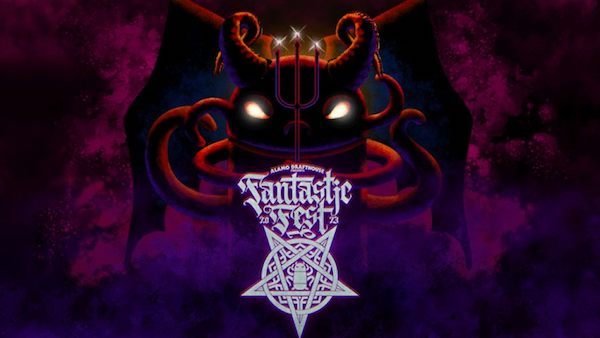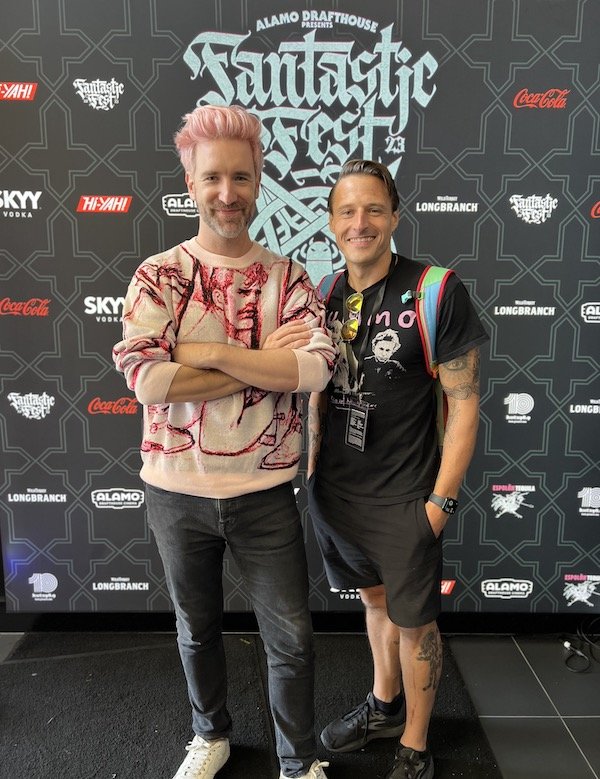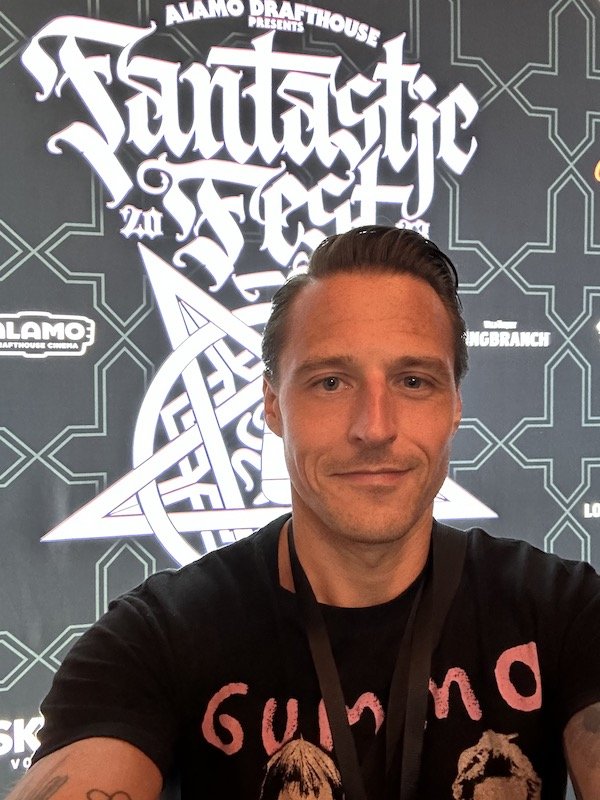Fantastic Fest 2023 Diaries: Day Eight
Since I went to bed early, I could get back on my early-bird bullshit. I arose around 5:45, and took the dog out for a long walk. When we came back, I gave her some food, cracked open a can of yerba mate, and started to get ready for day, which would involve my first and only 8am press & industry screening. I wanted to get going before the rush hour traffic got gnarly, so I dipped out around 7am, which would get me there really early.
I got a real bitchin’ first-floor parking spot, and then I walked down to Medici for some cold brew and breakfast tacos. While I scarfed down, I started working on the Day 7 diary until it was time to walk back up to the theater for my press screening of Jamie Childs’ feature film debut, Jackdaw, which had its world premiere last Friday.
The film is rapturously photographed, stripped down and revved up action thriller that takes audiences on a night drive odyssey through various Northern London locations. It motors around — occasionally stalling out — with ample atmospherics, raver energy, and cool demeanor. Its script has some breakdowns (like the motorbike), but the film goes pretty far on dank fumes of its style and swagger. It’s very confidently directed and full of objectively beautiful images and cinematography. Oliver Jackson-Cohen gives a strong performance as Jack Dawson (AKA Jackdaw). He kinda reminded me of the stoic intensity of Ryan Gosling and Michael Fassbender; the festival programmer likened him to Steve McQueen, which I can also see. The film feels like Drive meets Warriors with the look and grit of John Wick and Nightcrawler, the pulse of a Tony Scott thriller, and the calculated direction of David Fincher. It throttles the engine between good and great, and made for a solid morning matinee. The thumping pulse of its synth rave score helped energize me along with the cold brew.
After Jackdaw, I motored on back to Medici to finish up the Day 7 diary before it was time for my interview with David Velduque for Tranción. He and I met up at the Highball around 10:30, and we commandeered a karaoke room upstairs above the lounge to have our chat. We talked for about 30 minutes and had a really lovely conversation that will be uploaded in the not-too-distant future.
After our interview, we went down to the Fantastic Fest banner to take some photos, where we ran into the Mario Mayo and his crew for I’ll Crush Y’all (Os Reviento), which had just won the festival’s Audience Award a few days prior. They cleared their Audience Award pallet out of the way and snapped a few pics for us. I seized the opportunity to talk with Mario and his team and get a picture with them as well before heading in to my next screening, a 4K restoration of Gregg Araki’s Nowhere which I had never seen.
Originally released in 1997, Araki’s Nowhere is a chaotically charming cinematic distillation of 90s youth culture that’s intravenously administered. From its opening titles, it embraces the aimlessness of its colorful and quirky characters and creates a sporadic, crazy-cool kaleidoscopic no-wave narrative that pulls you all over L.A. and flies all over the place with reckless abandon.
It’s a sensuous assault, a bombardment of bodies and sexual politics, sprinkled with eccentricity, peppered with personality, and dipped in disassociation. It’s love sick, dope sick, life sick, and world weary. It’s up, down, and all around nature makes for an insane experience that captures the particular 90s feeling of angst, alienation, and loneliness, and it metamorphoses those feelings into a really fascinating insectiod hangout film. Like a loud, liberated, and totally unhinged Dazed And Confused about the 90s directed by John Waters on a mix of cocaine, poppers, ecstasy, and acid.
It was a fucking trip — a ride most cinemagoers wouldn’t want to take — and while it was strange and uneven for me, it’s still occupied a lot of space in my mind. I’m that guy who gets off the nauseating whiplash of a rollercoaster ride and wants to get in line for it again. Maybe something is wrong with me — or maybe I’m just that 90s kid.
After Nowhere, I head back home to tend to the dog. We go out for a nice long walk and throw a stick around. When we come back, I do an early dinner and find the motivation to do a little work (even though I wanna take a nap). I get the Toxic Avenger, Where The Devil Roams, and Strange Darling Q&As built out on the website, and I post them to social media, which takes longer than it ought to. Feeling somewhat productive, I take the dog out for another walk, hop through the shower, and get ready for my final screening of the festival, Michel Gondry’s The Book Of Solutions.
I head down an hour before my screening to hangout in the Highball a bit. The crowd noticeably thins out in the festival’s second half, which is nice. I grab a drink and a booth and read a chapter out of Alasdair Gray’s Poor Things, which I’ve been neglecting this week due to the festival. I’m still on pace to wrap it up before the Yorgos Lanthimos adaptation releases, which is a film I’m eagerly anticipating (especially after it won the Golden Lion prize at Venice Film Festival). While I read, there are people in the masks from Totally Killer, the festival’s closer, roaming around and building hype. Just as I finish a chapter, it’s time to make my way over to the theater.
The Book Of Solutions is Michel Gondry’s latest film in eight years, and it’s a confessional comedy about his experience making Mood Indigo. It’s a light-hearted, bright, and touching movie about movies and the hardships of making them, both self- and industry-inflicted. You could call it a comedy of composition — “a new genre” — about the majesty and magic that sometimes manifests through the infantile and naïveté of inexperience. But it’s not all laughs and light either; there’s feelings of stress, anguish, and depression in there as well. It chronicles the highs and lows of the creative process, and it plays like an autobiographical ode to and apology for Gondry’s creative craziness and muchness. There is a lot of rain but also a lot of sunshine, lots of sadness but also lots of love and laughs; it’s lopsided and symmetrical at the same time.
It rivals Microbe And Gasoline and Be Kind Rewind as his most grounded work (but gives itself permission to include more surreal sequences), and while every film is a personal film to the one who births it into existence, this one feels like Gondry’s most intimate and personal work to date, a film that opens up a portal directly into his imaginative and chaotic head for 100 minutes.
It’s clear that he had a painful experience with Mood Indigo — he must hate it so much he would rather burrow a hole into his theater seat than watch it — but art is born out of pain and trauma and love and sometimes even distraction, and The Book Of Solutions embraces all those things. It feels like a therapeutic release of feelings whose contempt for a bad experience spurns something that nourishes the creative drive and soul, both within its maker and the audience.
Pierre Niney is a terrific Gondry stand-in; he nails his tenacity and eccentricities, and he gives the character a lot of emotional depth. Niney’s Marc Becker is also surrounded by a lot of women who keep him tethered to reality and also try to help him achieve his ambitions and endeavors. The film also feels like a love letter to the females who stood by and supported Gondry throughout his creative journey as well. (In fact, it’s dedicated to his aunt Suzette, who is also a basis for a character in the film).
The titular book of solutions makes a literal appearance in the film. It’s something Niney’s character had started but stopped after writing the title, and it becomes both a distraction and an answer for him in the context of the film. Its contents include the following: 1) start your project, 2) learn by doing, 3) don’t listen to others, 4) listen to others.
The funny and very French ride Gondry provides is one that uplifts and entertains. It’s nice to be told (or reminded) to “start the project before the doubt saps your drive,” to submit to the childlike and surrender to the process. Niney says in a mid-point voiceover, “You just have to go. Do whatever you want.” Well, Gondry can continue doing whatever he wants, and I’ll still be there in line for it. Let’s just hope it doesn’t take another eight years.
I don’t think I could have picked a better film to end the festival on. As I exit the theater, I stop a the festival banner for a selfie, and close the books on another Fantastic Fest. This year was certainly a great one, with fantastic people and films. I bail out on the closing night party — which in retrospect may have been a mistake — but I was exhausted. Now that all the fun is over, it’s time to get all the work done. I’m already counting down the days til the next one, until then, keep an eye out for the flood of Fantastic Fest content that will drop over the coming weeks.
Fiending for more Fantastic Fest?! Check out the links below:
Fantastic Fest reviews
Fantastic Fest podcasts
Fantastic Fest articles
Fantastic Fest lists
What do you think? We want to know. Share your thoughts and feelings in the comments section below, and as always, remember to viddy well!








